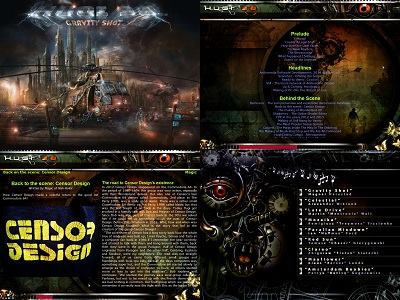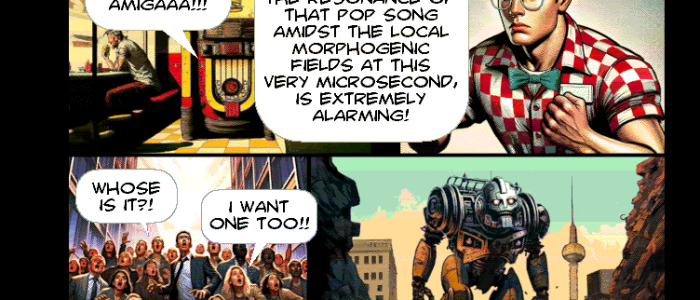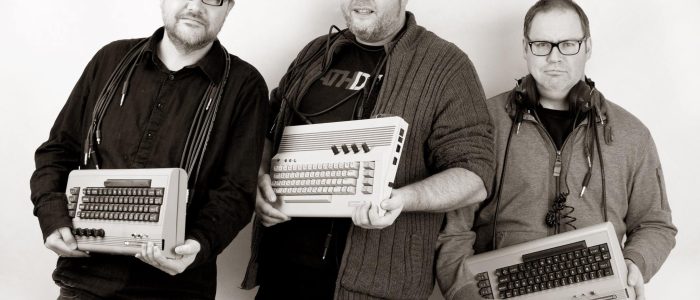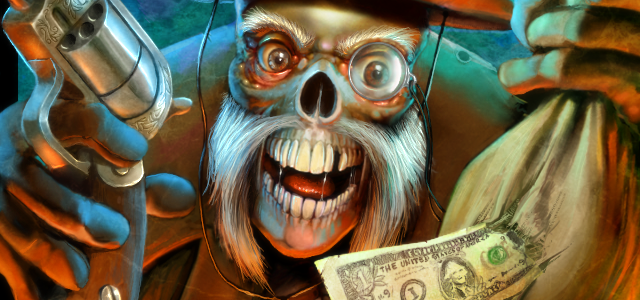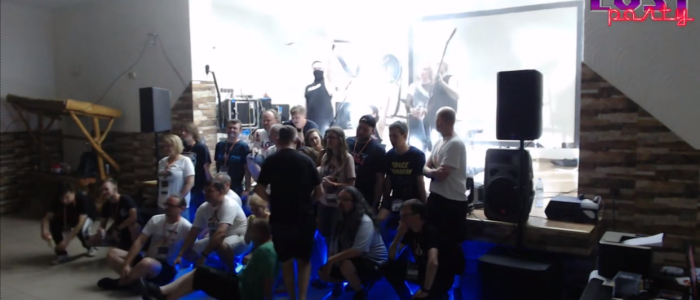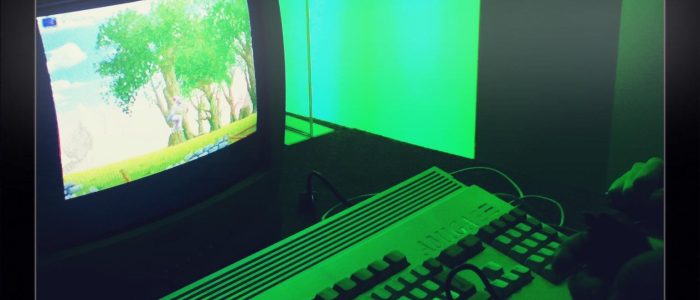Have you ever thought about why Sceners spend so much time, so many hours, on their hobby: the Scene? Written by Sane / Monk.
What is the reason Sceners do what they do? What is the reason Sceners spend countless hours on a virtual hobby, in a primarily digital world? Why do they continue an adolescent hobby long after they grew up, years after leaving high school and university? Why do they spend so much time on a computer Scene even though they have a demanding job, a wife, a girlfriend (or both!) and even children? And why do they stick to a Scene (C64, Amiga or Atari) that belongs to an ancient computer? A computer that just barely survived the tooth of time? It seems illogical to do so. So, why?
In the eighties and nineties of the past century computers like the C64, Amiga, Atari and the like were state of the art machines. Some were more advanced than others of course, but you catch my drift. Many young guns wanted to get their hands on such a computer more than anything in the world. A lot of boys (and very seldomly: a girl) had one of the beforementioned computers on their wish list and were happier than ever before when mum & dad or Santa granted their most desirable wish and got them such a lovely piece of fine hardware.
Some of these youngsters did not only play games on those computers, but came in contact with a strange subculture called the Scene. All Scenes were vibrant places to be in back then. Many thousands of likeminded people accompanied the mostly young Sceners in their travel through a new digital world. Computer Scenes were hustling and bustling. Constantly fresh blood was pouring in. The Scene was a vibrant place full of youngsters. It makes sense Sceners wanted to do something constructive for a Scene at that point in time.
Besides all that, most Sceners of yesteryear had little more to do than having fun. Be it in a Scene or in real life. Going to a pub, doing sports, occasionally doing some homework for school and Scening was about all the average Scener had to care about back then. And let us be honest: in the eighties and nineties there was not much else to do when it comes to having fun anyway. We had MTV, some more than average computer games and the Scene.
We did not have Facebook and there was no Twitter, Instagram, Snapchat, TikTok or whatever it is the average young person spends most of his or her time on nowadays. There was no Playstation 5 with hyper realistic games, no Netflix, Prime Video or Disney+ and we had to live without augmented- and virtual reality. When the old Scener of today was young, the Scene was a logical choice. But is it still a logical choice today, anno domini 2022?
Today, most active Sceners are past their fortieth birthday or even their fiftieth. More often than not, the average Scener of today is in a serious relationship. Most Sceners are married with children and they have demanding jobs. If they are not married with children, they can be divorced with children, married without children or just in love. What I am trying to say is that most Sceners will have better things to do than spending countless hours on a lost world. So, why is it that they do what they do then? It is a mystery. Or is it not?
Why do they keep the Scene spirit alive?
To solve the mystery, I asked a few well-known and respected Sceners why they keep on going. Why it is they do what they do and why they stick to a worn out, outdated, ancient computer and the corresponding Scene. Why do they keep the Scene spirit alive?
Dan is clueless at first, but then he tries to solve the mystery anyway: „I have absolutely no idea! That’s a really difficult question for me to answer… I guess coding, creativity, competing, challenging myself! Even in the 20+ years where I wasn’t active, I was still thinking „how would I do that on Amiga?“, so I guess it’s an infectious hobby that you can’t shake off!“
Virgill said: „Limitation gives me creativity. That is why I still torture the Paula chip.“ That sounds very interesting and promising. It offers a good explanation too. Much like Dan, Virgill is like a sportsman going to the Winter Olympics who constantly tries to get better results out of the same equipment and out of himself.
Wiklund suggests something similar as Dan and Virgill did: „I would say it is the idea of pushing yourself artistically with the limitations of the computers. I’m constantly thinking about to make something sound like more audio channels then it actually is. The same goes with the sound design when you manipulate it to sound like an „actual“ instrument.“
Paradroid is on the same level as Dan, Virgill and Wiklund: „My day job in the game dev is all about working with high level languages, APIs that are constantly evolving and hiding the hardware, and requires sacrificing some performance in favour of compatibility and maintainability – It’s a lot easier than it was back when I started, but it can be a bit boring.
It is a nice distraction to play with hardware that I know isn’t going to change, and really try to push it as far as it can go without any compromising, and then some more.“
Ok3an0s is being realistic, nostalgic and a bit poetic at the same time: „For my part I do it because Amiga was the first computer with which I could express myself „artistically“ when I was younger. Now that I am older the motivation is still there, but with more maturity and a tint of nostalgia than when I was a young and a stupid teenager.“
Browallia knows exactly why he keeps the Scene spirit alive and even knows what to say to friends and relatives when they don’t understand his passion for the Scene: „I think the driving force is the slot defining a period of our lives and then we are hooked to this for our lives. For a family member or someone not understanding, I always use the allegory of a bunch of people meeting with their old cars, polishing them and exchange ideas. What we belong to in the Amiga scene is kind of unique.
Such a movement can never exist on the PC for example. PC-people in the scene are jealous of the identity we have around Amiga for sure. Then I think it is sad that many people are stuck in what the „old legends“ or pioneers did in the past. Remember that the true spirits we should honor, are the ones keeping this going – not old chewing gums.“
Ghandy keeps it short: „I always said that I am writing articles as long as it makes fun. And it still does.“
Facet elaborates a little more and states the following: „Why we start scening again? It is because the life we now have; having a time consuming wife, kids, a busy job, active social life and a too big mortgage that we want to escape. And what is better to escape back to 1987 (or so) when the only pressure you felt was getting enough grades at school. Whether this girl wanted to kiss you and an upcoming deadline of some great production you worked on … And now … so many years later. You are doing the same thing with the same people. How fantastic is that!!! It is better than Disney+, Netflix and Prime combined … and just add all the PS or Xbox games to that. That’s why. The scene is the ultimate escape room for our generation!“
Curt Cool is even more extensive in his reply than Facet was and mentions: “I continue to think that the scene is a wonderful stage for some of my creative activities (such as music), and also think it is a fairly unique subculture worth supporting and preserving the digital artifacts created over the years. Whereas music needs my full attention while creating it, archiving has turned out to be a way of relaxing after a rough day to me, perhaps comparable to the mainstream who might be bingewatching some (from my point of view) artistically boring Netflix show.
Something which the demoscene (as well as literature and music), being driven by amateurs having it as a hobby, being uncommercial, is not. Basically, I do not find that money and art go very well together, and very often larger commercial media productions such as movies, series and computer games need to make money, and are thus created with all the mental sugar that comes with all commercial products, more precisely the extreme focus on the consumer, number of hits and viewers, fear of shitstorms etc.
I much prefer art to be driven by the artist’s imagination and ideas, and though of course not all demoscene productions (or other kinds of media created by „amateurs“) are particularly good, they are at least authentic and not necessarily made with a particular purpose in mind, such as dancing at the disco, training at the gym or just relentlessly entertain fans of a particular genre or franchise. I tend to refer to these pieces of „art“ as furniture – the kind of paintings, you would see on the walls of a major corporation, the kind of music you train to at the gym but would never listen to at home etc., just fulfilling a purpose – but not really containing any of the intellectual and transcendental potential, art should have.”
Reed, who has been inactive for a few years now still knows exactly why he has been in the Scene for so long and why he will again start composing tunes for a Scene some beautiful day: „The answer for my part is that at the moment I am not really „going on“ with scene stuff, I haven’t even made any music in several years. It is on the „any day now…“ list of activities. I do sometimes check out Pouet, some productions or compo streams, mainly for entertainment and a glimpse of what is going on in the scene. Why? Well, I guess I enjoy seeing „records being broken“ and people achieving new levels in their creative output, whatever their specialty is. And the scene used to be a fairly big part of my life at some point, so there is a sense of warmth and familiarity in it.“
So that is probably why Sceners do what they do and that is why they keep on going, why they keep the Scene spirit alive. No matter what. And against all odds. Sceners want to challenge themselves in a limited environment. They want to constantly improve their qualities and get the best out of ancient hardware. In the meantime Sceners desperately try to escape the claws of reality, to relive their youth with the same people they spent their teenage years with and to cherish the warmth of the Scene and its inhabitants.
The Scene is for most of the Sceners the most likely place, maybe even the only place, to be able to do that. Sometimes Sceners linger in real life and stray away from the Scene for a while, sometimes even for years, but they always come back to their one true love: the Scene. And even in the hearts of old Sceners who have been inactive for almost two decades, like Darkhawk, the flame of the Scene never really dies. When I spoke to him, he said: „I haven’t really kept going, hehe. No organizing, swapping or writing since 2004, just some socializing and boozing. Although a comeback to the Scene is never out of the picture …“
Written by Sane a.k.a. sAner
(*) Alle mit einem Stern gekennzeichneten Links sind Affiliate-Links. Wenn Du über diese Links Produkte oder Abonnements kaufst, erhält Tarnkappe.info eine kleine Provision. Dir entstehen keine zusätzlichen Kosten. Wenn Du die Redaktion anderweitig finanziell unterstützen möchtest, schau doch mal auf unserer Spendenseite oder in unserem Online-Shop vorbei.





